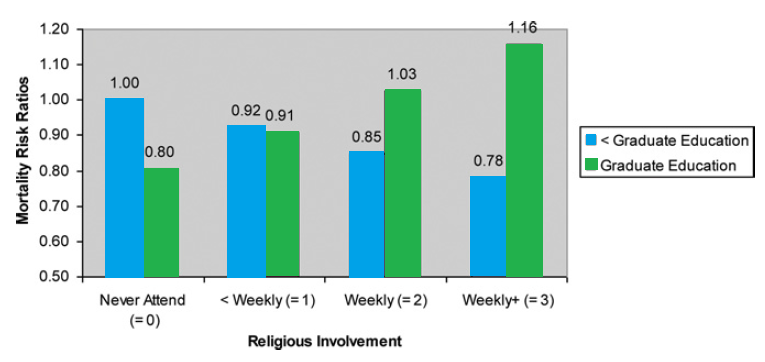Long-time readers of this blog may remember a post from 2009 on religion and health. It summarized the findings of nearly 60 studies, and concluded that while going to church seemed to be linked to better health, religious beliefs per se were unimportant.
Studies that have been published since seem to support this notion, but what nobody’s been quite sure of is why church going should be linked to better health at all. Two recent studies have shed some light on the issue.
The first used data from a survey of 35,000 Norwegians, and found that regular churchgoers had lower blood pressure – after taking into account other factors that can affect blood pressure, such as age. Blood pressure is a good general indicator of your overall cardiovascular health, and so picks out those people most at risk of having a heart attack or stroke.
Now, there have been a lot of previous studies that have found similar things, but this is the first large study in a mostly non-religious country. Given that only 4% of Norwegians attend church regularly, it’s fascinating that the link between church and blood pressure still holds.
The second study is even more interesting.
Darren Sherkat, a sociologist at Southern Illinois University, and Ben Moulton (a data analyst), wanted to find out how religion, health, and education interact. They used data from 22,000 Americans who participated in the National Health Interview Survey in 1987, and whose deaths were recorded over the next 20 years.
What they found (after crunching the numbers through a model to account for a host of other factors) is best understood by taking a quick squint at the graphic below. Higher bars indicate greater likelihood of dying.
You can see that, for the less well educated, the risk of dying goes down as church attendance goes up. As you would expect.
Surprisingly, however, for the educated the effect is exactly opposite! Educated people who go to church often are actually more likely to die young!
Sherkat puts this down to the double-edged effects of religious teaching on healthy behaviour.
On the one hand, it encourages abstinence from harmful drugs like tobacco and alcohol. That’s great for the ill-educated who may not know any better (or be motivated to abstain). But not so much use for the educated, who have had the risks drummed into them and who are unlikely to overdo the booze and fags in the first place.
On the other hand, it tends to undermine science and evidence-based medicine. That might be particularly a problem for the educated, who might otherwise be expect to know better.
Overall, because there are more ill-educated people than educated ones, religious attendance has a beneficial effect. But the benefit really accrues to the ill-educated. For the educated, religion (at least, the kind of religion widely practised in the USA) might actually be harmful.
![]()
Sørensen, T., Danbolt, L., Lien, L., Koenig, H., & Holmen, J. (2011). The Relationship between Religious Attendance and Blood Pressure: The Hunt Study, Norway The International Journal of Psychiatry in Medicine, 42 (1), 13-28 DOI: 10.2190/PM.42.1.b
Moulton, B., & Sherkat, D. (2012). Specifying the Effects of Religious Participation and Educational Attainment on Mortality Risk for U.S. Adults Sociological Spectrum, 32 (1), 1-19 DOI: 10.1080/02732173.2012.628552
 This article by Tom Rees was first published on Epiphenom. It is licensed under Creative Commons.
This article by Tom Rees was first published on Epiphenom. It is licensed under Creative Commons.















